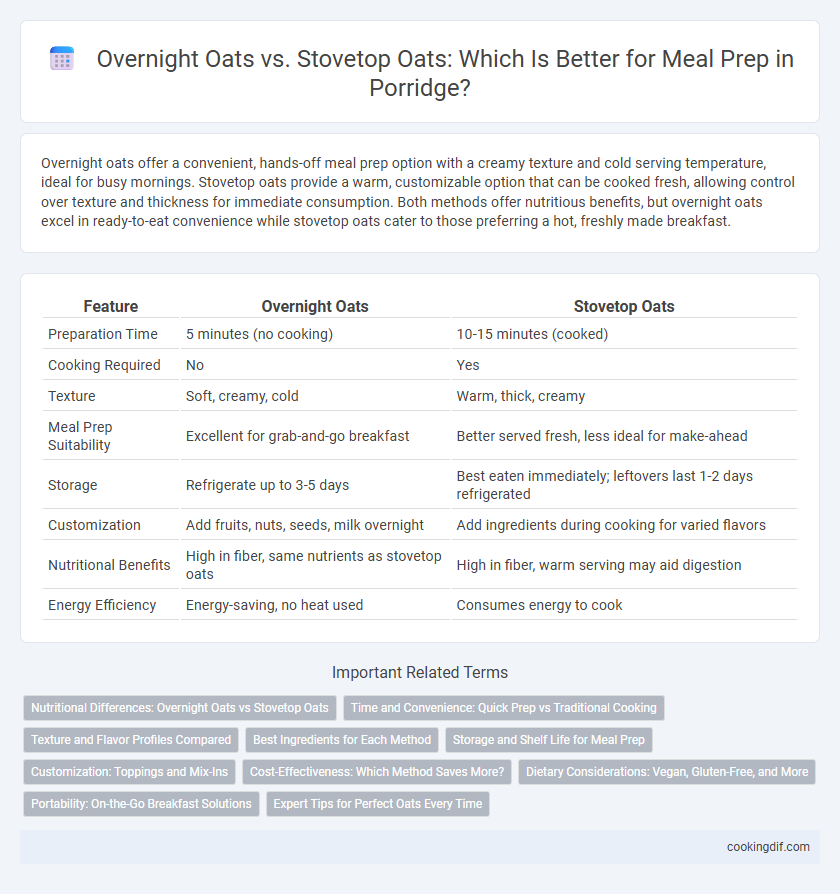Overnight oats offer a convenient, hands-off meal prep option with a creamy texture and cold serving temperature, ideal for busy mornings. Stovetop oats provide a warm, customizable option that can be cooked fresh, allowing control over texture and thickness for immediate consumption. Both methods offer nutritious benefits, but overnight oats excel in ready-to-eat convenience while stovetop oats cater to those preferring a hot, freshly made breakfast.
Table of Comparison
| Feature | Overnight Oats | Stovetop Oats |
|---|---|---|
| Preparation Time | 5 minutes (no cooking) | 10-15 minutes (cooked) |
| Cooking Required | No | Yes |
| Texture | Soft, creamy, cold | Warm, thick, creamy |
| Meal Prep Suitability | Excellent for grab-and-go breakfast | Better served fresh, less ideal for make-ahead |
| Storage | Refrigerate up to 3-5 days | Best eaten immediately; leftovers last 1-2 days refrigerated |
| Customization | Add fruits, nuts, seeds, milk overnight | Add ingredients during cooking for varied flavors |
| Nutritional Benefits | High in fiber, same nutrients as stovetop oats | High in fiber, warm serving may aid digestion |
| Energy Efficiency | Energy-saving, no heat used | Consumes energy to cook |
Nutritional Differences: Overnight Oats vs Stovetop Oats
Overnight oats retain more heat-sensitive vitamins, such as vitamin C and some B vitamins, due to the absence of cooking, while stovetop oats may lose these nutrients during the heating process. The starch in overnight oats undergoes a form of retrogradation, increasing resistant starch content that benefits gut health and blood sugar regulation, unlike the more gelatinized starch in stovetop oats. Protein digestibility is slightly higher in stovetop oats because cooking breaks down anti-nutrients, but overnight oats maintain a higher content of heat-sensitive antioxidants.
Time and Convenience: Quick Prep vs Traditional Cooking
Overnight oats offer unmatched convenience by requiring minimal prep time, as ingredients are combined and refrigerated overnight, making them ideal for busy mornings. Stovetop oats involve traditional cooking, requiring active stirring and about 5 to 10 minutes on the stove, which can be less time-efficient for meal prep. For those prioritizing quick, grab-and-go breakfasts, overnight oats provide a faster, hassle-free option compared to the stovetop method.
Texture and Flavor Profiles Compared
Overnight oats offer a creamy, smooth texture with a mild, naturally sweet flavor due to prolonged soaking, making them ideal for a quick, no-cook meal prep. Stovetop oats develop a thicker, heartier consistency with a rich, toasted flavor from direct heat, enhancing the meal's depth and warmth. Choosing between the two depends on whether you prefer a softer, chilled porridge or a robust, warm bowl with a chewy bite.
Best Ingredients for Each Method
Overnight oats benefit from ingredients like rolled oats, chia seeds, Greek yogurt, and plant-based milks, which create a creamy texture without cooking. Stovetop oats perform best with steel-cut or old-fashioned oats, combined with water or milk, and often enhanced by spices such as cinnamon or nutmeg for warmth. Both methods allow for nutrient-dense add-ins like fresh fruit, nuts, and natural sweeteners, optimizing flavor and nutrition during meal prep.
Storage and Shelf Life for Meal Prep
Overnight oats offer superior convenience for meal prep with a typical refrigerator storage life of up to five days, maintaining freshness and texture without reheating. Stovetop oats, while cooked fresh and ideal for immediate consumption, generally have a shorter refrigerated shelf life of two to three days and may require reheating that can affect consistency. Choosing overnight oats maximizes storage efficiency and meal planning flexibility by allowing pre-portioned servings that stay ready-to-eat throughout the week.
Customization: Toppings and Mix-Ins
Overnight oats offer unparalleled customization with a wide range of toppings and mix-ins easily incorporated before chilling, allowing flavors to meld for a more cohesive taste. Stovetop oats provide flexibility in texture adjustment during cooking and enable the addition of fresh toppings post-preparation for added crunch and freshness. Both methods accommodate diverse dietary preferences, but overnight oats excel in convenience and flavor infusion.
Cost-Effectiveness: Which Method Saves More?
Overnight oats use minimal energy since they require no cooking, making them more cost-effective for meal prep compared to stovetop oats, which consume gas or electricity. Stovetop oats offer faster preparation but increase utility costs due to continuous heating. Bulk purchasing of oats benefits both methods, yet overnight oats maximize savings by reducing energy expenses.
Dietary Considerations: Vegan, Gluten-Free, and More
Overnight oats offer a convenient option for vegan and gluten-free diets when prepared with plant-based milk and certified gluten-free oats, ensuring compliance with dietary restrictions. Stovetop oats can also be adapted by selecting appropriate oat varieties and adding naturally vegan toppings such as nuts and fruits, providing flexibility for varied dietary needs. Both methods support meal prep strategies, but overnight oats excel in ease of customization and require no cooking, making them ideal for busy, health-conscious individuals.
Portability: On-the-Go Breakfast Solutions
Overnight oats offer superior portability for on-the-go breakfast solutions due to their no-cook preparation and convenient storage in jars or containers, making them easy to grab and eat anywhere. Stovetop oats require cooking and immediate consumption or reheating, which limits their practicality for busy mornings. For meal prep, overnight oats provide a time-efficient, mess-free option that maintains texture and flavor without the need for reheating.
Expert Tips for Perfect Oats Every Time
Overnight oats require no cooking and offer a creamy texture by soaking rolled oats in liquid overnight, making them ideal for quick, grab-and-go meal prep. Stovetop oats involve boiling oats with water or milk, delivering a warm, customizable porridge with a thicker consistency and enhanced flavor through simmering. Experts recommend using rolled oats for overnight preparation to ensure proper absorption and steel-cut oats for stovetop cooking to achieve a hearty, chewy texture and optimal nutrient retention.
Overnight oats vs stovetop oats for meal prep Infographic

 cookingdif.com
cookingdif.com